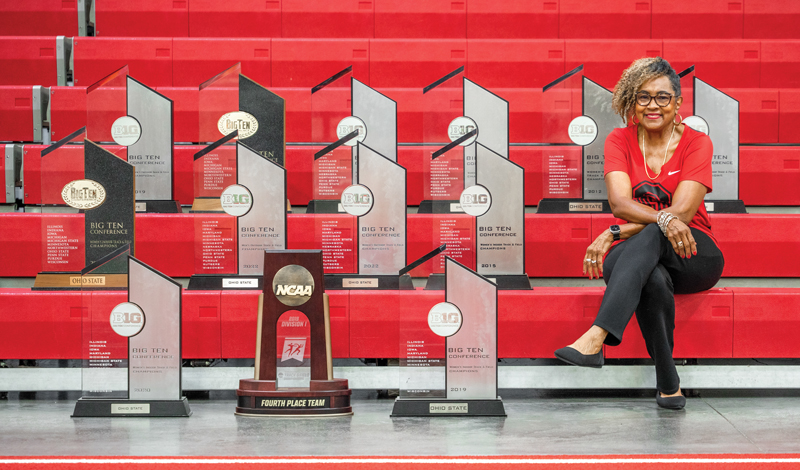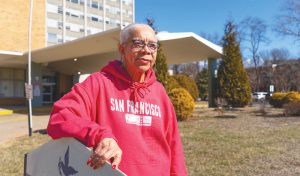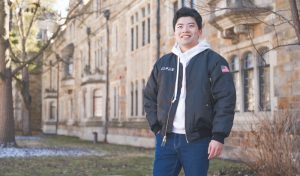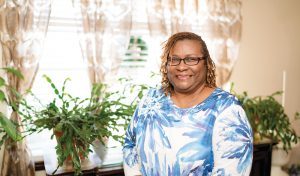Living Buddhism: Thank you, Karen, for speaking with us. We hear your brother, Tim, introduced you to Buddhism in the 1970s. Could you tell us more about how you started practicing?
Karen Dennis: Tim called our first family meeting. We’d never had one, but we all came around our parents’ dining table in Detroit, expectant, a little skeptical, looking at him like, Well?
“Well,” says Tim, “I’ve found the key to happiness.”
He didn’t look crazy. He looked serious and assured.
He drove all the way here for this? I thought. Above the heckling of my siblings, “All right,” I said. “Give me the key.”
Over the next 30 days, morning and evening, I chanted the “key” my brother gave me: Nam-myoho-renge-kyo. “Make a list of goals,” Tim had said, “and don’t hold back.” Topping my list was “pass stats,” something I knew was impossible. Wrapping up my first year at Michigan State University (MSU), I’d shown my face just once in my statistics class before deciding it was hopeless. The self-paced exams had piled up, the material way over my head.
At the bus stop one day, two weeks into my Buddhist practice and two weeks out from the end of the year, I struck up a conversation with another student. He was about to graduate, he told me. Wistfully, I congratulated him, then said, “I’m failing stats.”
“Oh,” he said, “that class. I had it. Very hard.” We kept talking, and it turned out he’d kept his old workbooks with the completed exercises inside—did I want them? That night, I chanted with appreciation, even awe. But the battle had just begun: If I wanted to pass, I’d need to put in the work. I went into my advisor’s office the next day and discovered that, as an athlete, I was eligible for a personal tutor and an extension. Long story short, I passed.
That was it for me. This works, I thought. Nam-myoho-renge-kyo works.
What else were you chanting about?
Karen: The other thing on my list was energy. I was a single mother, no money, bouts of depression. I could sleep all night and not feel rested. We had hot dog meals most of the time because they were simple.
There was another student, Bob, a fellow Buddhist, who lived, like me, in the MSU student housing. Tim had got us connected, and every morning since, the first thing I saw each day was Bob striding down the campus walk toward my apartment, wearing this silly smile. I thought, I’ll shut the blinds, pretend I’m not here, go back to bed. But I never did. He’d knock, I’d answer and every morning we did gongyo together. The thing was, I knew I’d feel better after chanting; I felt better, ate better, slept better, woke up with more energy to study, prepare meals and care for my daughter. I also found more enthusiasm to resume running track.
You were at MSU to run?
Karen: That and pursue a degree. I’d met MSU’s head coach, the legendary Jim Bibbs, when I was 13, after losing a race I should have won—I’d weaved outside my lane and been disqualified. Afterward, crying in the backseat of my father’s car, I heard a tap at the window—coach Bibbs. “If you join my track club, I’ll teach you to run inside the lines.” Jim became like a second father to me. Through my newfound Buddhist practice and his constant encouragement, I summoned the will to go for what I’d all but given up on—a national championship win. In my junior year, I did win. When I graduated, I was taken aboard as an assistant coach for the women’s team.
At the time, you had no intention to coach long term. What led you to continue for 10 years at MSU?
Karen: A slap in the face.
As assistant coach, scouting and recruitment is crucial. I’ll never forget one young woman, Odessa, whose 200-meter dash time had garnered her dozens of scholarship offers from universities all over the country. I’d had my eye on her for two years and visited her and her family many times, assuring her that MSU was the program for her. But when it came time to decide, she said she was going to Iowa. Iowa? Why Iowa? And she told me flat out: “I’ve never been coached by a woman.” What she meant was she doubted I could coach on par with the country’s top male coaches. And she’s not the only one, I realized.
As with any challenge in my career, I hit it straight on with daimoku. Ours was an emerging program at Michigan State, and I planned to make her its cornerstone. That’s how I talked to her. “If you come,” I said, “others will follow. I can coach you. You just have to trust me.”
I believe she could feel my intense prayer for her happiness and success, and for the victory of the program as a whole. She came to MSU, and I coached her to multiple championships.
It wasn’t the last time you’d have to prove yourself to aspiring champions.
Karen: True. In 2002, I arrived at Ohio State University as the assistant coach for a dual-gender program.
We had room to grow, with a men’s team that hadn’t won a championship in 25 years and a women’s team that had never won one. The women routinely placed at the bottom. The only silver lining was that, once you hit bottom, the only way to go is up. My prayer was to move us upward. In 2006, the position for women’s head coach opened up, and I went into the interview with a five-year plan to make program history: to take the Ohio State women’s team from dead last to the very top.
Sounds daunting!
Karen: When a team loses year after year, an expectation of loss and mediocrity comes to pervade the program. Changing that ingrained culture was difficult and necessary work. My first year as head coach, one of the star athletes I’d managed to recruit told me flat out, “Had I known this was the state of the program, I wouldn’t have come.” Some parents took their doubts to the administration, saying I wasn’t cut out for the job. The criticism stung; without my Buddhist practice, I’d have crumbled. But I’d staked my life and career on the Buddhist principle of the “oneness of life and its environment,” which holds that all phenomena in our environment are a reflection of our own lives. All that was going on in my career was my problem to solve.
What did you do?
Karen: Grind. As second Soka Gakkai President Josei Toda said, “In faith, do the work of one; in your job, do the work of three” (Youth and the Writings of Nichiren Daishonin, p. 20). If I was going to transform the Ohio State culture, my determination would be decisive. If I grew complacent, that complacence would make its way into the hearts of all my athletes. But if I roused courage, that courage would take hold of everyone. By my fifth year, we made Ohio State program history, taking home its first women’s track and field team’s championship title. We did it again and again over the next decade.
Incredible. In 2014, you became Ohio State’s director of both the men’s and women’s track and field teams, a position held by less than 3% of women throughout the country. In such a position and competing at such a high level, how did you keep the prerogative of winning from overshadowing the happiness of the students?
Karen: So, I understand the spirit of the question; we’ve all heard of coaches who sacrifice too much for a medal. But as a disciple of Ikeda Sensei, my honest feeling is that winning is the prerogative. As Sensei says: “Winning is exhilarating and joyful. Winners’ smiles are beautiful” (September 4, 2009, World Tribune, p. 5). Buddhism and athletics—they run parallel; in both, it’s win or lose. This is where faith comes in.
Morning and evening, I woke up and chanted for the happiness of these young people, for their total victory on and off the track. Based on that prayer, I took action. I got to know their families and struggles, and I made it a mandate for my staff to meet kids when it was convenient for the kids. If a student’s pre-med courses meant they had to miss evening practice, I made sure someone was there to work with them in the morning. If they needed to be at the hospital early on a nursing schedule, someone would be on the track to work with them in the evening.
Once students saw that I was willing to do anything extra within the bounds of the rules, they took it upon themselves to do their best. A shared spirit to strive inevitably pervaded all areas of our lives—school, friendships, family, work. As a Buddhist coach, I always went for the win; this brings out the best in people. Then, win or lose, there are no regrets, because we know in our hearts, we did our best.
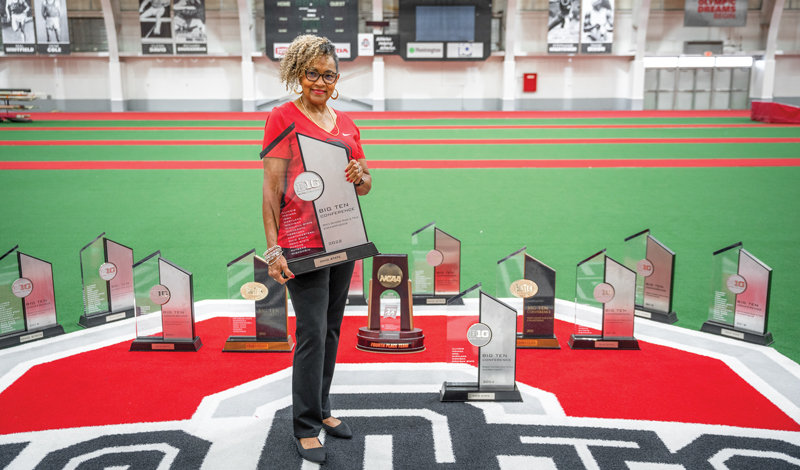
It sounds like you built an incredible program. What do you consider your greatest victory?
Karen: When I became the director of the men’s and women’s teams, three of the top male athletes walked. Like Odessa, they’d simply never been coached by a woman. I let them go and assured those who stayed that if they gave me a chance, we’d find success as surely as I had with the women’s program. Twenty-five years had passed since the men’s team had won a Big Ten championship, so I knew my work was cut out for me. So work I did, with faith, practice and study as my foundation. In 2018, our men’s team won both the indoor and outdoor Big Ten championships.
Two years later, I told my boss I would be retiring within a couple of years. But after chanting, I decided that my mission wasn’t quite finished. I decided to strive to make program history one last time. I committed myself to the goal of both the men’s and women’s team winning the Big Ten championship in the same year. Both teams were now in the top three of our conference and among the top 10–20 teams in the country. We were working harmoniously together as a combined staff and team who believed we were the people who would accomplish this lofty goal.
In my final season, 2022, our women’s team won the indoor championship and our men’s team was second. During our outdoor campaign, we were firing on all cylinders! Our men achieved a victory for the third time in my career, and our women also won!
During my coaching journey, my teams won 13 Big Ten championships, ranking us No. 1 among all Ohio State sports programs. I’ve been inducted into the Hall of Fame for three prestigious organizations and voted coach of the year by my peers 13 times.
The biggest difference between the person I am today and the person I was before I started my practice is this: I’ve learned to appreciate the good times and the challenging times. In both gain and loss there’s benefit if you can see things from a high life condition. It all comes down to my Buddhist faith, practice and study. Nichiren Daishonin states, “A sword is useless in the hands of a coward” (“Reply to Kyo’o,” The Writings of Nichiren Daishonin, vol. 1, p. 412). When feeling low, faith resurrects my courage. No course in life is smooth sailing, but through faith, I’ve learned that I can create the conditions for victory.
You are reading {{ meterCount }} of {{ meterMax }} free premium articles

